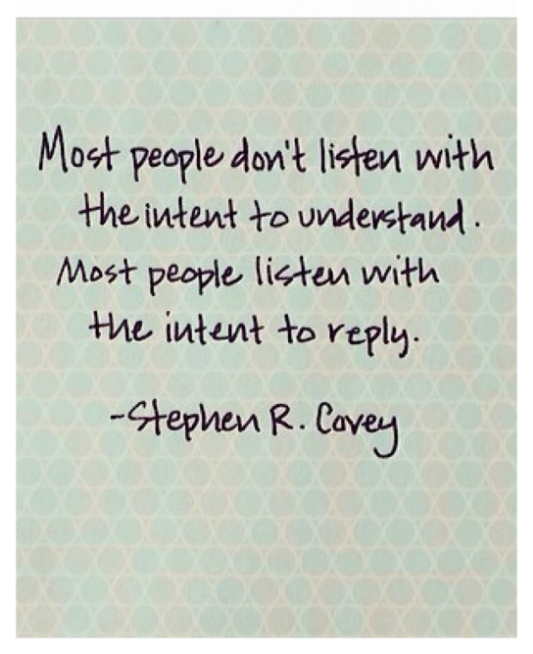on listening
One of the people that I follow on Instagram is Kelly Beall of Design Crush. Every day, Kelly posts one of her favorite quotes, all handwritten and all variety of subjects. There is one in particular that really struck a chord with me last week.
Now, I’m not much of a self-helper or power business book person. And we’ve already discussed my issues with reading. However, I have not been able to stop thinking about this particular sentiment.
Here’s the thing. I’ve got a daughter who never stops talking. And while it appears that she is waiting for a response, she actually never listens to it. And we’ve almost stopped listening to her because her chatter is so incessant. In thinking about this quote, it occurs to me that maybe, just maybe, the reason she never stops talking (or repeating herself) is that she actually does not feel heard. Maybe she doesn’t feel understood. You are going to probably throw something at me now as I say that she is not quite four, and I am still concerned abou this, but the reality is when you actually sit with her and talk eye to eye, she listens and she understands. But you have to stop. And you have to somehow make her stop.
There’s more. She’s one of seven kids. Am I listening to understand any of them or am I listening to respond? The more I think about it, the more I realize that I’ve really been in the habit of listening to respond. It’s like quick draw around here sometimes. As a parent, you’ve got the next question prepared before they answer the first because you are trying so hard to get your kids to think through problems on their own. And usually, two people are talking at once. In that kind of environment are we really listening?
I finally caught up with the last two weeks of Downton Abbey on Monday and, as always, the Dowager Countess was on fire. But this was what hit right home. In response to Cousin Isobel's lack of understanding, the Dowager Countess replied, “If you wish to understand things, you must come out from behind your prejudice and listen.”
Right there is the first question. Do you really wish to understand? With people that we don’t know well, perhaps the answer is no. Perhaps we are simply listening with the intent to reply. But with those closest to us, I suspect we do seek to understand. And maybe we forget that to understand is the motivation behind our communication. Not all the time, of course. Sometimes, we just need to make dinner plans or find out who is in charge of carpool. But more often than not, our conversations with those closest to us, or I should say, at least my conversations with those closest to me, are about understanding that person.
So here we are. The intent is there to understand. But the prejudice is also there. I will be the first to admit that I am full of prejudice with respect to all of my kids. I think I know them and my response to what they say comes from what I think I know. If I step back, and remove that layer, will our communication (and with it, their confidence) improve? And if that is the answer, how do I come out from behind my prejudice?
I don’t have any answers to these questions, so I put it to you. How do you stop long enough to listen to what your kids, your spouse, your parents, your best friend is saying? Do you listen with the intent to understand or to respond? Or is there an entierly different motivating factor behind your listening? Do you think it is possible to come out from behind your prejudice in order to understand? How do you even recognize what those prejudices are? Leave a note for me. I’d love to hear what you are thinking.

